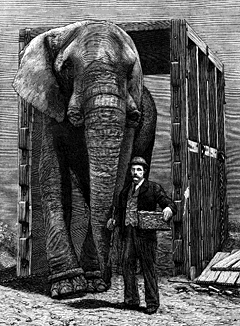JF Ptak Science Books LLC Post 421
 Dedicated to David Robinson
Dedicated to David Robinson
There are some squinty-eyed connections between one of America's greatest printer/publishers (Isaiah Thomas), William Shakespeare, Mother Goose, P.T. Barnum and Jumbo the elephant. There are clear connections at the two ends of these relationships, but what is the thin corpus callosum that completes this house in which the Mother Goose-Jumbo lineage happily live? (There's a hint in there: "house")
Isaiah Thomas was the first person to put Shakespeare into print in America. For some reason, the Bard had escaped publication on our lovely shores until 1786, when Thomas, an innovative and savvy businessman and reader, published (not for the first time) some of the Mother Goose stories (Mother Goose's Melody, or, Sonnets for the Cradle: In Two Parts...*) and included, as a toss-in, hanging out in the back of the book, some of Shakespeare's sonnets--the first time Shakespeare was printed in America. At the end of Mother Goose. It would take only a decade for all of Shakespeare’s work to be put out in a collected edition (in Philadelphia, by Samuel Johnson in 1796), but for some reason American appetite for this impossible talent was fed by British publishers, the keepers and controllers of The Memory.
The "house" in question here is Shakespeare’s own, and in folds nicely into the Jumbo part. The deal was that, somehow, the Bard's Stratford residence was up for sale. It was Barnum's (1810-1891) idea to purchase the place, cut in into little pieces and ship it across the ocean for display in his New York location, and then, perhaps, to cart it around the country. The British heart turned inside out and was instantly covered with marble crumpets at the breadth of the idea--the house was instantly removed from sale and declared a National Treasure, to be saved forever in England. Which seemed like a good idea when faced with the alternative--how it could've come to pass that Barnum could've gotten so far in the purchase plans and negotiations is a little beyond me. (I can see it now--Barnum moving the Bard's house out in little bits, at night, to waiting wagons, just like the way the Colts were stolen from Baltimore, Johnny Unitas' soul twisting slowly in the swirling, blizzardy wind of that night.) 
Barnum's brain** turned into an itchy scab, and the way he scratched it would be to buy Jumbo (1861-1885), the world's largest elephant, from the London Zoo. The Brits were furious over this, too, but since we're talking elephant and not Shakespeare, the annoyance passed, probably as soon as the fartacious Barnum lifted his foot from British soil. Poor Jumbo toured the country and wound up being squashed by a locomotive in Ontario, his skin going to the Natural History Museum in D.C. and his heart to Cornell. Barnum's body simply went into a box and into the ground. Mother Goose's body too wound up in the earth for a comfortable dirt nap. Shakespeare's body isn't in his tomb.
*Thomas, Isaiah, William Shakespeare, and Oliver Goldsmith. Mother Goose's Melody, or, Sonnets for the Cradle: In Two Parts : Part I Contains the Most Celebrated Songs and Lullabies of the Good Old Nurses, Calculated to Amuse Children and to Excite Them to Sleep : Part II: Those of That Sweet Songster and Nurse of Wit and Humour, Master William Shakespeare : Embellished with Cuts, and Illustrated with Notes and Maxims, Historical, Philosophical, and Critical. Worcester (Massachusetts): Printed by Isaiah Thomas, and sold at his bookstore, 1786.
**Barnum's first name was Phineas, as is the first name of Mr. Gage, a railroad worker who survived a spectacular accident in which a large metal tamper was exploded through his skull and brain, removing a frontal lobe. Maybe there is a connection, maybe not. (Sorry.)
An Estimate of the Number of Shakespeare's Atoms in a Living Human Being
"It straightforward to determine the number of Shakespeare's atoms that enter a person each day through breathing, drinking and eating. The result is almost 20 billion. That means that, even if one's body were cleansed of the playwright's atoms, it would only take about 10 days to return to "normal." If you live to 75 years, some 500 trillion of his atoms enter you during your life. After we've lived a while, our direct knowledge of Shakespeare is rather substantial, which proves the statement that education is a lifelong endeavvor. The only reason why you have just 200 billion of his atoms in you is that you are also losing his atoms at virtually the same rate as you are gaining them, as the analysis on equilibrium in Part I above makes clear."



Comments